In this episode: Janet answers a question from a parent whose toddler resorts to hurting himself when he’s angry or frustrated, and she’s wondering if there are some “better options” to teach him when he’s expressing his emotions.
Transcript of “Children Hurting Themselves When They’re Upset”
Hi, this is Janet Lansbury. Welcome to Unruffled. Today, I’m going to be responding to an issue that is fairly common. This parent has a specific question, but I often get questions along these lines from parents who are concerned that their children are hurting themselves when they get upset, and what can the parent do about that.
So here’s the question I received:
“My toddler is biting himself when he is frustrated and mad in situations. We know he is expressing himself, but want to help teach him other strategies. Is there an article already posted about this where we can get some insight? Or what would some better options be, other than biting himself?”
So I often get notes like this, parents asking about their toddler hitting their head on the floor when they’re upset or scratching themselves, biting themselves, doing other harmful behaviors. And this is a bit of a sensitive issue, because what happens is: a child will be in the midst of a tantrum, and just have this impulse to hit their head on the floor, hit their head on something, or bite themselves, as in this example. And that’s a very organic response that they have right there, but our emotions in the situation and our response are kind of crucial.
Naturally, we get upset. We’re human, and here’s our little baby hurting himself or herself. This is really scary. We want to say, “Stop. No, I won’t let you.” And so our reaction ends up influencing our child even more to want to repeat what they noticed pushed such a button in their parents. We’re infusing the situation and whatever emotion our child is feeling with our own emotion. And that becomes something kind of interesting and puzzling that our child has to then figure out.
Children in these early years are amazing learners and they’re deeply compelled to figure things out, especially things about their parents. “What makes them tick? What’s going on? What gets a reaction? Why is it that they lose their cool sometimes, when I’m just doing something impulsive?”
So they then have to explore that. They may still be in a tantrum, but now there’s this added element where they’re drawing us into it through their behavior. So that’s obviously where we don’t want to head with this, because that’s when a child’s natural, lashing out behavior can become more dangerous. On its own, these kinds of meltdown behaviors do not tend to cause serious damage. Children will not intentionally damage themselves seriously. It’s more that they want to connect with something, they want to feel something, they want to lash out, and it’s not unhealthy.
But when we get involved, it can cross those lines. Obviously, that’s the last thing we want to happen. So then we have this very challenging job of not only trusting the feelings and the tantrum and the meltdown and the frustration, that it’s healthy for our child to experience that, but also trusting the way it’s manifesting. Obviously, we’re going to be able to block when harmful behavior comes directed at us. We’re going to be able to put our hand there and say, “Yes, you wanna hit me right now. You’re that mad.” Or if our child’s actually in the eye of the storm of the tantrum, the best thing is not to say anything, but just have that be our subtext if our child does make eye contact. We’re nodding, we have our hand placed there easily to stop whatever’s going on.
But then if our child is doing this to themselves, we still have to trust. We can’t come in with fear and helping them protect themselves. This is an example of parenting for the big picture, which is one of our big challenges as parents, and hard to do, because the big picture and what we want to do in the moment often don’t go together. What most of want to do in that moment, when our child’s hurting themselves or even when our child’s having a meltdown and not hurting themselves, we want to say, “Oh hey, it’s not so bad. Ooh. Don’t do that to yourself. What’s going on? You can feel better.”
We want to stop the feeling, most of us. And especially if the feeling is causing scary behavior. We just want that to stop. But again, those reactions in the moment will actually make this behavior worse and more frequent. So we have to see it a different way. We have to see it with trust. And then once we have that trusting attitude, there are some things that we can do. But they have to be from a chilled-out place. And they have to be while we’re encouraging the feelings.
In other words, in this situation with the toddler biting himself, you might say, “Yeah, ooh. You wanna bite yourself. Here’s something you can bite.” And then we have a teething ring or something. We’re not running off to get something. We’re not urgent. We’re just offering the suggestion. That’s the best we can do. That’s the best chance we have for our child to take us up on that and not need to keep exploring the power of their behavior over us.
So, if a child is hitting their head on the floor, let’s say, there the child isn’t even looking at us, so I wouldn’t say anything unless they made eye contact. But I would just get a little thin pillow or something and just tuck it under my child’s head while they’re in the middle of that. Not trying to stop the emotion. Again, actually encouraging them to vent, because I know that that needs to happen. That’s the best thing they can do. And I’m just gonna do some little things to make it a little safer for them.
But I’m seeing that in the big picture, my child having their flow of emotions and me not getting in the way of that is the best thing. That’s how they will get the message that it’s safe for you to go to these places in yourself. And they do pass. That’s what builds resilience, and eventually, children do have more emotional self-control. What we can provide is the safety and trust and the message that, “It’s okay for you to feel what you’re feeling. I want you to do that. I don’t want you to try to put it away from me or hold it in or make it look different. I’m just here to hold the lines and the boundaries around hurting me or other children, or doing really dangerous things. But mostly, I trust you to vent.”
So this, like a lot of advice I give, isn’t easy. It’s an attitude. It’s really understanding our role in these situations is as more of a therapist. We don’t want to get in the way of what is healthy and important for our child to get out of their body.
So, the best way she can help teach her child other strategies is really just to trust what he’s doing right now and make small suggestions in the moment. Offer him other ways that he can get those feelings out safely, very gently, and then not trying to demand he takes you up on it.
One of the parents I was working with had this issue. Her daughter was banging her head on the floor when she was upset and the mother did the natural thing of, “Ooh, don’t do that. I can’t let you hurt yourself. I’m gonna stop you,” and reacting viscerally, as we do. She was telling me that now this was becoming something her daughter was doing, and even when she wasn’t that upset, she seemed to be doing it. So I said what I said in this podcast, basically. “Don’t give it power. Trust it. And if there’s something small you can do, like put a little blanket under her head, slip it under there. Don’t tell her you’re doing it, just kind of sneak it in.”
Then this mother told me the next time I saw her, she realized that her daughter was actually looking up at her first before she was hitting her head, which made it even clearer to this mother that that had become something she was doing for her mother. Obviously not something her mother wanted her to do, but she was engaged in her mother’s reaction to it, and that became the purpose of the behavior, to explore that.
I should mention quickly that, with head banging specifically, in some small children, it can be part of a developmental problem. Frequent head banging, particularly if there’s a question of developmental delay or abnormal social interactions, that should be evaluated by a doctor. So if you have any real concerns, please consult a professional.
I think this parent in the note really does have the right attitude. She says, “We know he’s expressing himself.” And yeah, I would just have her trust even more. I would suggest that she maybe gives a little casual alternative, but otherwise trust, stay out of his way. This too shall pass.
Also, please checkout some of my other podcasts at janetlansbury.com. website. They’re all indexed by subject and category so you should be able to find whatever topic you’re interested in. And remember I have books on audio at Audible.com, No Bad Kids, Toddler Discipline Without Shame and Elevating Child Care, A Guide To Respectful Parenting. You can also get them in paperback at Amazon and an ebook at Amazon, Barnes and Noble, and Apple.com.
Also I have an exclusive audio series, Sessions. There are five individual recordings of consultations I’ve had with parents where they agree to be recorded and we discuss all their parenting issues. We have a back and forth that for me is very helpful in exploring their topics and finding solutions. These are available by going to sessionsaudio.com and you can read a description of each episode and order them individually or get them all about three hours of audio for just under $20.
Thanks for listening. We can do this.

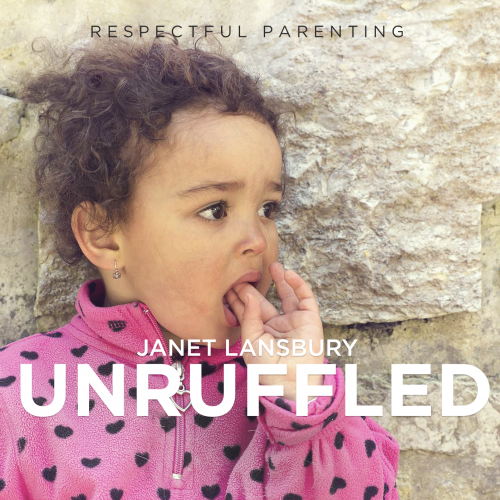
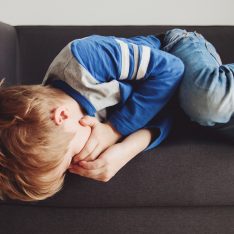

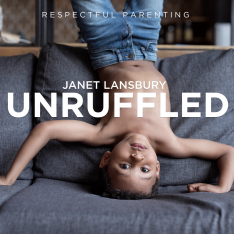

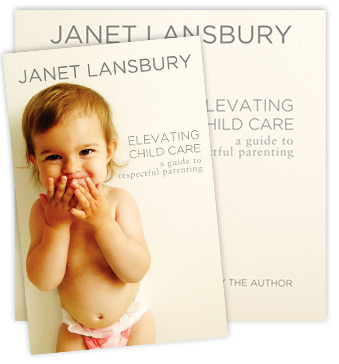

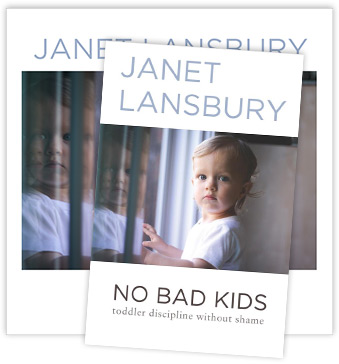

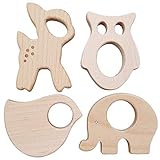




Hi Janet,
I came across your podcast last week while thumbing through and it may have come at just the right time. I am at my wits end with my daughter’s middle of the night tantrums.
I think that a lot of her behavior stems from the high level of stress she must be feeling due to her father and I still going through custody proceedings and her father’s very unsettled lifestyle.
I haven’t been able to stop her from throwing her food on the ground, but she’s typically still hungry 30 minutes after I take it away because of her doing this…and even though I give her a snack before bed she is still waking up 2 to 3 hours after I put her down screaming for food (or so I think). We eat dinner around 6 or 630 and she is asleep by 8 when she is with me. She does not stop screaming when she wakes up. I typically sit next to her and gently remind her I’m here and periodically pick her up and put her back in bed, which she climbs out of again, and again, and again. I honestly think this could go on for 3 hours if I didn’t distract her. Unfortunately, I have a housemate and this is extremely disrespectful of me to let this go on. Not to mention, I am working full time and desperately need this sleep for my own mental health. I’m at a complete loss. With this behavior among others like throwing her food on the floor, or her cup on the carpet. I don’t want to give in in the middle of the night, but I also can’t let it go on for so long. It’s every single night lately.
Do you have any words of wisdom for my specific situation?
Hi Janet
I just listen to this episode and my take away was to trust our children and maybe offer a small suggestion and wait for the feelings to pass. At the same time, I was wondering how do you see teaching children some simple age-appropriate strategies to deal with anger. Of course not in the moment itself, but rather when they are calm and in a “receiving” mood. I’m struggling with this a bit – on the one side, it might be useful and important especially for kids who have the tendency to hurt others or themselves when angry. On the other side offering alternative behaviors seems a bit like an attempt to distract them from their feelings.
I would greatly appreciate your input!
Best regards
Ana
Hi Janet,
I love your podcasts and I’ve also been reading your book “No Bad Kids” but there is some very concerning behavior I’ve noticed with my 2 year old so I thought I’d reach out.
First of all a little about us. My little boy is 2 years and 1 month old. His little sister was born when he was 23 months. He has been having trouble adjusting with these changes even though me and my husband have done all we can to make this an easier transition for him. He has also just moved to the over 2’s area at his daycare where there is less 1:1 time and more children, plus a bigger area.
He has been having tantrums on and off since he was about 1 year old. He has big feelings and we deal with these gently, by trying to name the feeling and staying calm, keeping him and others safe as much as we can. This has become more difficult with the baby to take care of as well.
The recent concerning behaviors are:
– He throws things at his little sister or tries to scratch her legs or hit her. This doesn’t happen very often, but mainly when his dad tells him “no” he comes running to me when I’m feeding his sister and lashes out at us. Most of the time I’m able to block him with my hands but we’ve had a few close calls. E.g.: He threw a big plastic toy (quite heavy) and I blocked it just before it hit her head.
– He bangs his head on the floor (forehead), throws himself backwards on the floor, or more recently bangs his head on the wall or glass door. This is quite concerning for me so I normally try to stop him from hurting himself with my hand or move him to a safer place like the couch until he feels better. Then I offer him a cuddle which he is happy to have.
– He hits or scratches or pulls hair – at home and at daycare (to the teacher and other kids.)
We are a loving family and have tried to do what we can to make this a smooth transition but he seems to always want to be with me instead of his dad, especially when he’s tired and I know he is hurting but I also can’t leave the baby hungry when he wants me. It’s so hard because he looks at me like I’ve betrayed him by having his sister, and it breaks my heart.
I’m sorry for the long message, but I’m really hoping you have some suggestions for us.
So far we’ve tried:
– Including him in caring for his little sister such as passing me a nappy or choosing clothes for her.
– I pay attention to him, talk to him and play with him even while breastfeeding or holding the baby.
– We name his emotions and encourage him to express his feelings but he doesn’t have enough words to name his feelings yet. He can tell us when he wants things and can form some small sentences.
I also wonder if I should take him to a pediatrician to check out the harming himself behaviour and maybe his anger.. These checks are not done very often here in New Zealand.
I will also add that he is a very loving and cuddly boy when he is not having tantrums or in a mood. He is usually excited about his baby sister, tells us to go to her as soon as he hears her crying, and is happy to play on his own too. We don’t have concerns about his development so far.
Thanks so much
Hi Janet
I just listen to this episode and my take away was to trust our children and maybe offer a small suggestion and wait for the feelings to pass. At the same time, I was wondering how do you see teaching children some simple age-appropriate strategies to deal with anger. Of course not in the moment itself, but rather when they are calm and in a “receiving” mood. I’m struggling with this a bit – on the one side, it might be useful and important especially for kids who have the tendency to hurt others or themselves when angry. On the other side offering alternative behaviors seems a bit like an attempt to distract them from their feelings.
I would greatly appreciate your input!
Best regards
Ana
This passive approach to parenting is causing an epidemic of the “little tyrant” syndrome.
Sometimes its a tough job handling an angry, choleric child, while keeping him safe (and those around him) but as parents we must be ready to intervene when necessary.
Its never an easy thing to discipline a child, but it is our responsability as parents to raise our children into patient, self disciplined and congruent adults.
And what would you do?
Tell us in detail how gentle parenting is either passive or harmful. Your vague and unsupported assertions are wholly unconvincing.
Hi Janet!
Really love your blog and your books! When I read or listen it is so often I get those “aha” moments and wonder why I didn´t think of this obvious way to talk to toddlers before (Obvious when you point it out but I have so often said the “normal” response: Don´t do this, no, you have to share, etc. as I worked as a kindergarten teacher for many years).
I was wondering if this hurting behavior you talk about in this podcast also applies to infants? My son is 5 mo and he sometimes bangs his head against the wall, I think most of the times he has done that he has been very tired. He is very mobile and can army crawl his way any way he wants but he sometimes gets stuck in corners and cries for our help, even though we know he can get out of there by himself. We decide to help him since we think he is overtired. I´m just surprised that this behavior can occur so early, any advice on how we should address it when we are in the situation?
Best regards
Sigrun
Hi Janet,
My daughter has bitten herself in a highly emotive situation and I can understand hwownjt your saying about can relate to this. However, today she hit a boy at preschool and he hit her back. Later she scratched herself in the face and claimed that the boy did it to her! Can this just be her expressing her sadness at the situation or is there more too it if she’s blaming the other child. I’m finding this behaviour pretty upsetting and disturbing! She is 3.5 years old. I’d love to hear your thoughts on this
So I hate admitting that I don’t have enough money to get my daughter an actual crib at the moment but we have her in the pack and play with a cushion to help her sleep. But she has a huge issue with going to sleep when she doesn’t want too. She will slam her chin and arms on the side of it and she does it to the point she is bruising herself badly. I feel like I’ve tried everything for her to quit. I’ve even tried to Not come back right away to see if she will tire herself out but she can do it for an hr straight depending on how upset she is. I’ve tried to put a cushion on the side but she always gets it off. We are very lucky on the times she will go down easily. Sadly it doesn’t happen as often as we would like. I’m starting to get really worried. I don’t know what to do anymore. I am a first time mom and I have no idea what I’m doing. Please help.
Sing to her
Sing to her it will help talk very low
So I’m worried now. My 3 month old sometimes throws her hands up and today she hit herself under her eye and it looks a bit reddish under her eye now and she looks like she bruised herself. How should I handle this so she doesn’t do it again? I worried about her
This was very good. Thank you! My 2 year old tends to scratch her face when she is upset. I have tried disciplining her and it only continues to happen. After reading this article I realized that I need to just ignore it and/or take a different approach as you mentioned. Thank you so much! This was a very helpful. Now I know, this too will pass.